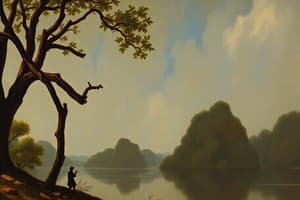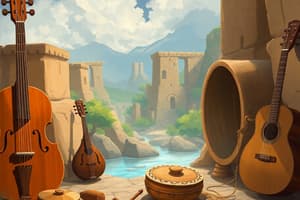Podcast
Questions and Answers
What is the approximate date of evidence of musical instruments in ancient cultures?
What is the approximate date of evidence of musical instruments in ancient cultures?
30,000 BCE
In ancient Egyptian music, what was the primary purpose of music?
In ancient Egyptian music, what was the primary purpose of music?
Religious rituals and ceremonies
What type of music emerged during the Middle Ages, focusing on courtly love and chivalry?
What type of music emerged during the Middle Ages, focusing on courtly love and chivalry?
Secular music introduced by Troubadours
What characterized music during the Renaissance period?
What characterized music during the Renaissance period?
Who are some notable composers of the Baroque period?
Who are some notable composers of the Baroque period?
What is the name of the musical form developed by Haydn, Mozart, and Beethoven during the Classical period?
What is the name of the musical form developed by Haydn, Mozart, and Beethoven during the Classical period?
What is a key feature of music during the Romantic period?
What is a key feature of music during the Romantic period?
What is a characteristic of contemporary music in the late 20th century onwards?
What is a characteristic of contemporary music in the late 20th century onwards?
What was the primary purpose of music in ancient Greece?
What was the primary purpose of music in ancient Greece?
What type of music emerged during the Renaissance period, influenced by classical Greek and Roman music?
What type of music emerged during the Renaissance period, influenced by classical Greek and Roman music?
What was the dominant form of music during the Middle Ages?
What was the dominant form of music during the Middle Ages?
Who were some influential blues artists of the 1930s?
Who were some influential blues artists of the 1930s?
What type of music reached its peak in the 1940s?
What type of music reached its peak in the 1940s?
What genre of music emerged in the 1950s, characterized by artists like Elvis Presley and Chuck Berry?
What genre of music emerged in the 1950s, characterized by artists like Elvis Presley and Chuck Berry?
What musical movement emerged in the 1960s, characterized by artists like Jimi Hendrix and The Doors?
What musical movement emerged in the 1960s, characterized by artists like Jimi Hendrix and The Doors?
What British bands brought a new wave of rock music to the US in the 1960s?
What British bands brought a new wave of rock music to the US in the 1960s?
Study Notes
Ancient Civilizations
- Music was an integral part of ancient cultures, with evidence of musical instruments dating back to 30,000 BCE.
- Ancient civilizations, such as:
- Egyptians (3000 BCE): used music in religious rituals and ceremonies.
- Greeks (8th century BCE): developed scales, modes, and musical instruments like the lyre.
- Romans (5th century BCE): adopted Greek music and instruments, introducing them to Europe.
Medieval Period
- Music during the Middle Ages (5th-15th centuries):
- Gregorian chant (6th century): monophonic, sacred music used in Christian worship.
- Troubadours (11th century): introduced secular music, focusing on courtly love and chivalry.
- Minstrels (12th century): traveling musicians performing for nobility and commoners.
Renaissance and Baroque
- Music during the Renaissance (15th-17th centuries):
- Polyphonic music: complex, multi-voiced compositions.
- Emergence of instrumental music: harpsichord, lute, and violin.
- Music during the Baroque period (17th century):
- Opera: developed in Italy, with composers like Claudio Monteverdi.
- Composers like Bach, Handel, and Vivaldi: created works for orchestra, choir, and solo instruments.
Classical and Romantic Eras
- Music during the Classical period (18th century):
- Sonata form: developed by Haydn, Mozart, and Beethoven.
- Symphony orchestra: established, with composers like Haydn and Mozart.
- Music during the Romantic period (19th century):
- Emphasis on emotion and individuality.
- Composers like Chopin, Liszt, and Brahms: expanded instrumental techniques and expressiveness.
Modern and Contemporary Music
- Music in the 20th century:
- Development of new musical styles: jazz, blues, rock, and pop.
- Experimentation with electronic and avant-garde music.
- Contemporary music (late 20th century onwards):
- Globalization and fusion of musical styles.
- Digital music production and distribution.
Ancient Civilizations
- Music dates back to 30,000 BCE with evidence of musical instruments.
- Egyptians used music in religious rituals and ceremonies from 3000 BCE.
- Greeks developed scales, modes, and musical instruments like the lyre from 8th century BCE.
- Romans adopted Greek music and instruments from 5th century BCE, introducing them to Europe.
Medieval Period
- Gregorian chant emerged in the 6th century as monophonic, sacred music for Christian worship.
- Troubadours introduced secular music in the 11th century, focusing on courtly love and chivalry.
- Minstrels were traveling musicians performing for nobility and commoners from the 12th century.
Renaissance and Baroque
- Polyphonic music emerged during the Renaissance, featuring complex, multi-voiced compositions.
- Instrumental music developed during the Renaissance, with popular instruments like the harpsichord, lute, and violin.
- Opera originated in Italy during the Baroque period, with composers like Claudio Monteverdi.
- Composers like Bach, Handel, and Vivaldi created works for orchestra, choir, and solo instruments during the Baroque period.
Classical and Romantic Eras
- The sonata form was developed by Haydn, Mozart, and Beethoven during the Classical period.
- The symphony orchestra was established during the Classical period, with composers like Haydn and Mozart.
- The Romantic period emphasized emotion and individuality, with composers like Chopin, Liszt, and Brahms expanding instrumental techniques and expressiveness.
Modern and Contemporary Music
- The 20th century saw the development of new musical styles like jazz, blues, rock, and pop.
- Experimentation with electronic and avant-garde music occurred in the 20th century.
- Contemporary music is characterized by globalization and fusion of musical styles, as well as digital music production and distribution.
History of Music
- Music has been an integral part of human culture for thousands of years, serving purposes such as entertainment, rituals, and storytelling.
- The earliest known musical instruments date back to around 30,000 BCE, with the discovery of bone flutes and drums.
- Ancient Greece saw the development of musical notation and the creation of instruments like the lyre and aulos around 500 BCE.
Music from 1930 to 1980
1930s
- The Great Depression led to the rise of jazz, with swing music becoming popular.
- Blues music emerged, with influential artists like Robert Johnson and Bessie Smith.
- Country music started to take shape, with the Carter Family and Jimmie Rodgers.
1940s
- Big band music and swing reached their peak, with Glenn Miller and Tommy Dorsey leading the way.
- Blues and rhythm & blues (R&B) gained popularity, with artists like Muddy Waters and Wynonie Harris.
- Early forms of rock and roll emerged, with artists like Bill Haley and His Comets.
1950s
- Rock and roll exploded onto the scene, with artists like Elvis Presley, Chuck Berry, and Little Richard.
- R&B and doo-wop continued to evolve, with groups like The Platters and The Coasters.
- Early forms of jazz fusion and cool jazz emerged, with artists like Miles Davis and Chet Baker.
1960s
- The British Invasion brought a new wave of rock music to the US, with bands like The Beatles and The Rolling Stones.
- Folk music saw a resurgence, with artists like Bob Dylan and Joan Baez.
- Psychedelic rock and the counterculture movement emerged, with artists like Jimi Hendrix and The Doors.
1970s
- Rock music continued to diversify, with the emergence of sub-genres like hard rock, soft rock, and progressive rock.
- Funk and soul music gained popularity, with artists like James Brown, Sly and the Family Stone, and Stevie Wonder.
- Punk rock emerged, with artists like The Ramones and The Sex Pistols.
1980s
- New Wave and post-punk music continued to evolve, with artists like The Clash and The Cure.
- MTV launched, bringing music videos to the mainstream.
- The rise of electronic and synth-pop music, with artists like Depeche Mode and The Human League.
Studying That Suits You
Use AI to generate personalized quizzes and flashcards to suit your learning preferences.
Description
Explore the importance of music in ancient cultures, including Egypt, Greece, and Rome, and its development during the Medieval Period.




